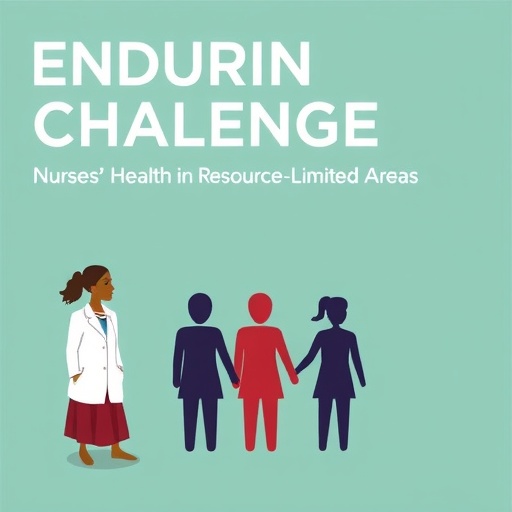In a groundbreaking study set to redefine our understanding of occupational health, researchers Patangia, B., Srinivasan, P.M., and Lee, M.C.C. delve into the intertwined realities of musculoskeletal discomfort and mental well-being faced by nurses operating within resource-limited settings. This comprehensive research, published in BMC Nursing, reveals alarming trends amid a demographic often overlooked yet integral to healthcare delivery in underserved environments. The title of the study, “We just keep pushing through,” encapsulates the stoic resolve of these healthcare professionals while highlighting the perilous implications of neglecting their physical and mental health.
Nurses are unequivocally the backbone of any healthcare system, yet their struggles frequently go unnoticed, especially in resource-limited contexts where they serve under immense constraints. The study’s findings underscore a pervasive issue—not mere physical strain but a significant toll on mental health. The dual pressures of dealing with patients’ needs and personal physical discomfort have propelled many nurses into a cycle of chronic stress and burnout, thereby necessitating urgent intervention at various systemic levels.
The research employs a mixed-method approach, effectively blending quantitative data with qualitative insights to provide a holistic view of the issues at play. Surveys conducted among a diverse pool of nurses highlighted staggering rates of musculoskeletal discomfort. More than half of participants reported experiencing chronic pain symptoms that significantly disrupted their daily activities, emphasizing the severe impact of physical ailments on their job performance. These findings call into question the adequacy of current workplace policies and practices aimed at safeguarding nurses’ health, particularly in challenging environments where resources are scarce.
Beyond physical pain, the study eloquently articulates the secondary psychological ramifications nurses face. Emotional exhaustion, anxiety, and instances of depression were alarmingly prevalent among participants. The researchers uncovered a troubling narrative: many nurses felt trapped in a relentless cycle of work-related stress, exacerbated by their inability to access necessary support and resources. Instead of finding reprieve, they often opted to “push through” their discomfort, perpetuating a harmful culture of self-neglect.
Moreover, the survey responses indicated a direct correlation between sustained musculoskeletal pain and mental wellness. Those suffering from physical discomfort reported higher levels of anxiety and feelings of inadequacy at work. This vicious cycle poses a significant challenge not only to individual nurses but also to the overall health care system, which struggles to maintain a competent and healthy workforce. The implications of these findings ripple outward, suggesting a potential decline in patient care quality in settings where nursing professionals are chronically overworked and underappreciated.
The authors also shed light on systemic barriers that inhibit adequate healthcare for nurses in these environments. Limited access to training on ergonomics, insufficient staffing, and lack of institutional support often mean that nurses are left to fend for themselves when it comes to their physical and mental well-being. This research advocates for a paradigm shift, urging healthcare institutions and policymakers to reassess the conditions under which nurses operate. By investing in training, resources, and support systems, the long-term benefits for both the workforce and patient outcomes could be monumental.
In an era where healthcare systems globally are facing unprecedented strain, particularly due to events such as the COVID-19 pandemic, the validity of this research must not be overlooked. It serves as a critical call to action, highlighting the necessity of prioritizing nurses’ health as a fundamental pillar of healthcare reform. Without the well-being of nurses, the entire healthcare system remains vulnerable, undermining the essential services they provide.
What sets this study apart is not only its extensive quantitative findings but also the rich, qualitative narratives from the nurses themselves. These personal accounts provide a poignant backdrop to the statistics, humanizing the often-abstract data. Nurses articulated their feelings of isolation and helplessness, emphasizing the urgent need for a support system that acknowledges the breadth of their experiences. The study thus advocates for a model that includes nurses’ voices in policy-making and healthcare system designs—ensuring that they are not mere afterthoughts but rather key stakeholders in crafting solutions.
The mixed-method approach employed by the researchers serves as a model for future inquiries into occupational health, where quantitative and qualitative data can illuminate varied aspects of a complex problem. This nuanced understanding could encourage future researchers to consider the psychological dimensions of physical ailments more rigorously. Future studies may explore interventions that effectively marry physical health approaches with mental health resources to create an integrated support system for nurses.
In conclusion, the study conducted by Patangia and colleagues provides a compelling overview of an urgent issue, shedding light on the interplay between musculoskeletal discomfort and mental well-being among nurses in resource-limited settings. It transcends the realm of academic inquiry, advocating for systemic changes that prioritize the health of healthcare providers as a prerequisite for quality patient care. The findings are critical for healthcare policymakers and institutions, urging immediate action toward fostering healthier work environments where nurses no longer have to “just keep pushing through.”
As the healthcare sector continues to evolve, it is imperative that the lessons from this study are not only recognized but actively implemented. The health of nurses is inextricably linked to the health of the communities they serve, and addressing their well-being must be a central focus if we are to move toward a more equitable and efficient healthcare system for all.
Subject of Research: Occupational health of nurses in resource-limited settings
Article Title: We just keep pushing through: a mixed-method study on musculoskeletal discomfort and mental well-being among nurses in resource-limited settings
Article References: Patangia, B., Srinivasan, P.M. & Lee, M.C.C. “We just keep pushing through”: a mixed-method study on musculoskeletal discomfort and mental well-being among nurses in resource-limited settings. BMC Nurs 24, 1301 (2025). https://doi.org/10.1186/s12912-025-03698-2
Image Credits: AI Generated
DOI: 10.1186/s12912-025-03698-2
Keywords: Musculoskeletal discomfort, mental well-being, nurses, resource-limited settings, occupational health, burnout, healthcare system.




